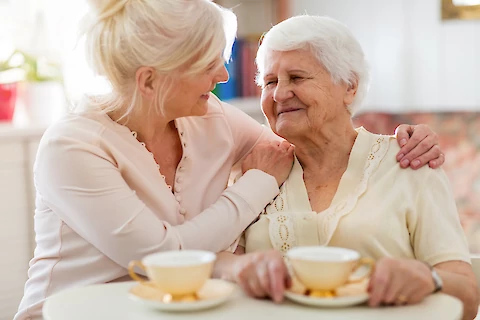
Seasonal Affective Disorder (SAD), while common in many individuals, presents unique challenges when it affects seniors, particularly those who receive in-home care. As a prevalent seasonal condition, addressing SAD in senior care can profoundly impact the physical and mental well-being of the elderly population. This makes it an important topic of discussion for both seniors and their caregivers. Explore everything you need to know about SAD.
Understanding Seasonal Affective Disorder (SAD) in Seniors
Seasonal affective disorder, or SAD, is a type of depression that changes with the seasons, typically setting in the fall and winter months when daytime is shorter. For seniors, this can be exacerbated due to limited mobility and social interaction. Symptoms of SAD in seniors may vary and can often be mistaken for the typical aging process, and these may include:
- increased fatigue
- loss of interest in activities
- changes in appetite or sleep patterns
- feelings of sadness or despair
Addressing SAD in senior care is important because it helps elderly loved ones deal with the symptoms of this condition.
Impact of SAD on Seniors' Health
The impact of SAD on seniors' health moves beyond the characteristic mood changes. Physically, SAD may lead to weight gain, disturbed sleep, and lethargy. Seniors with SAD may have a weakened immune system, increasing their susceptibility to illnesses. Mentally, continuous feelings of sadness and hopelessness may lead to severe depression or anxiety disorders. If SAD goes untreated, it can leave lasting effects on the seniors' overall health and quality of life.
Challenges of SAD for Family Caregivers
Family caregivers may find it difficult to recognize the symptoms of SAD in their loved ones. Symptoms can often mimic normal aging or be misunderstood as 'winter blues.' This can place an emotional burden on caregivers, who may struggle to understand and effectively respond to their loved one's changing moods and behaviors. Furthermore, family caregivers often juggle multiple responsibilities, including work, family, and senior care.
Practical Advice for Helping Seniors Cope With SAD
Fortunately, there are several ways caregivers can help seniors manage their symptoms. Lifestyle adjustments such as regular light exercise, a balanced diet, and establishing a regular sleep schedule can make a positive difference. Environmental changes like introducing more natural light into their living space or using a light therapy box can also aid in alleviating symptoms. As it can be challenging to diagnose and manage SAD, you want to recognize when it's time to seek professional help. If symptoms persist or intensify, consulting with a healthcare provider is advisable.
Senior Helpers Greater League City - Galveston, TX Supports Seniors With SAD
Seasonal Affective Disorder can significantly impact seniors' lives, but with the right understanding, support, and care, its effects can be managed. As a caregiver, knowing the symptoms and practical ways to support your loved one can make a world of difference. Remember, it's okay to seek professional help when needed. For those living in Galveston, League City, Dickinson, Lake Jackson, or Bay City, Senior Helpers Greater League City - Galveston, TX is here to help. Reach out to us today for more information about our in-home care services tailored to seniors battling SAD.